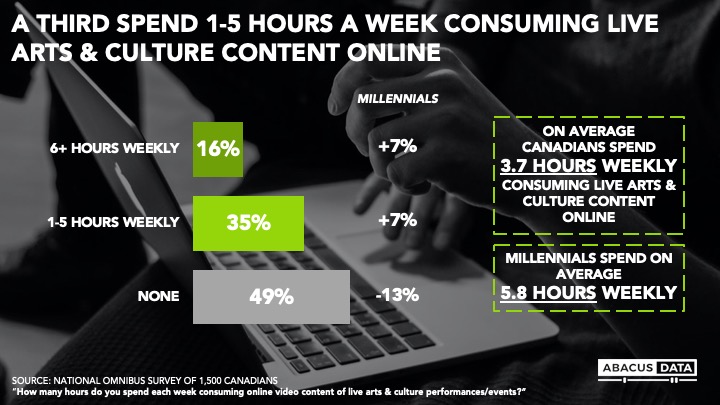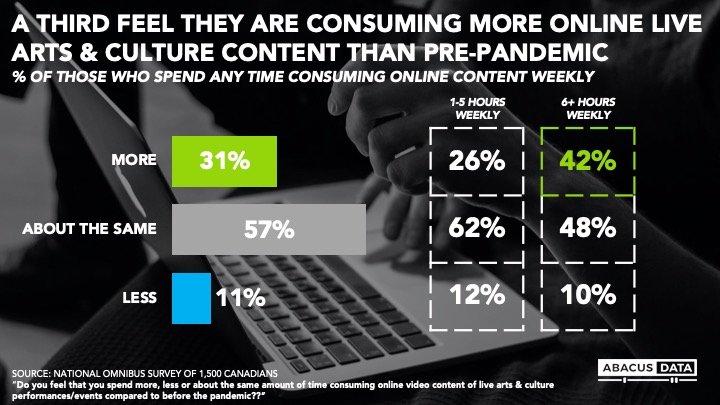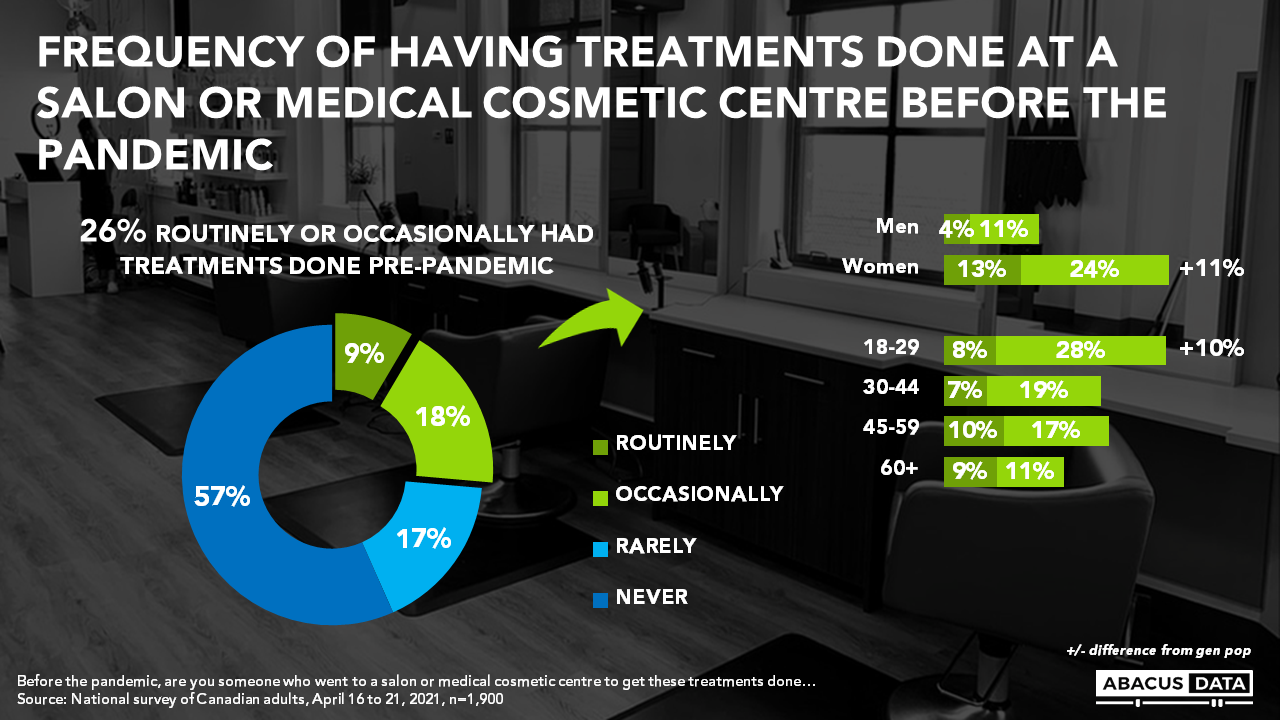Arts and culture during a pandemic and what will come next
January 8, 2021
In the past 20 years, new technologies have disrupted countless sectors, created entirely new industries, and fundamentally changed the way we live, work, and play. The COVID-19 pandemic has accelerated technological uptake and evolution in the most abbreviated time horizon we’ve ever witnessed.
In an effort to limit the spread of the virus while maintaining much needed social connection, more Canadians have turned to technology to help them stay in touch with friends, family, and coworkers.
Though most younger Canadians already used technology in their day-to-day life, older Canadians were pushed to learn and adopt new platforms – be it FaceTime, Zoom, Instagram, or any of the countless other web-conferencing tools out there – to keep in touch with loved ones, work remotely, and even connect with medical professionals.
Technology has taken on a role that surpasses efficiency or convenience, becoming a necessity for nearly all Canadians.
That being said, in many cases, the virtual experience pales in comparison to the in-person. With that in mind, we wanted to explore what in-person activities Canadians miss most and whether they have been looking online for ways to participate in these activities virtually.
Here is what we found:
While many of us have been bingeing full seasons of shows on our various streaming services, we found that just over half (53%) miss the big-screen experience of being able to go see movies in a movie theatre.
About 4 in 10 admit that they miss the experience of cheering on their favourite sports teams or singing along to songs at concerts or experiencing theatre performances. Just under a third miss dancing the night away at a night club or participating in interactive art experiences.
Millennials have been impacted the most when it comes to being unable to do many of the activities they enjoy and therefore miss the activities mentioned above more than other generations.

Many activities Canadians enjoy are in-person experiences, and during the pandemic, there has been a monumental effort to shift these experiences that are normally enjoyed in-person to digital venues.
On average, Canadians report that they typically consume about 3.7 hours of online video content of live arts and culture performances or events in a week – 5.8 hours a week for millennials, more than 50% more per week than the average Canadian. These activities could include online concerts or theatre performances or virtual live arts performances, etc.
Breaking this down, almost half (49%) say they do not consume these kinds of performances online, 35% say they consume between 1 to 5 hours of online content a week, and 16% consume 6 or more hours a week.

In the spirit of an increased focus on shifting in-person activities to online experiences, 42% of those who consume 6 or more hours of online video content of live arts and culture performances weekly say they are consuming more of this content than before the pandemic, and about 3 in 10 (26%) for those who consume 1 to 5 hours weekly.

Digging a bit deeper for what kind of online video content Canadians are consuming, we see that a third (33%) are viewing online live streaming content, and 24% are consuming online live concerts or live music performances. A small portion of Canadians reports that they typically consume webinars, vlogs, or participate in virtual hangouts like on Zoom or HouseParty online. Millennials consume more of the aforementioned online content than other generations.

As we move towards a post-pandemic world, about 3 in 10 (28%) of those who currently consume any online content weekly plan to spend less time online consuming or participating in live performances and virtual content online – even though a large majority (65%) are satisfied with the content available. Another 64% say they will spend about the same amount of time.

Once health officials permit certain activities to resume, and somewhat in proportion to the amount they have been missing certain in-person activities, Canadians will be most comfortable returning to outdoor concerts and seeing a movie in a theatre. There will be more hesitation when returning to other indoor activities like concerts, sports games, and interactive art experiences – the idea of jam-packed music festivals and night clubs will be a difficult sell as well.

Taking the above with a grain of salt, keep in mind that it is more likely Canadians will be more uncomfortable than comfortable returning to any of the in-person activities they have been missing. This means streaming services, online alternatives to live music and performances, and connecting with friends and family will continue to dominate for a while even after the pandemic is mostly behind us.
THE UPSHOT
According to Megan Ross: “Regaining the trust of Canadians will be a challenge in ensuring safety at many kinds of arts and culture in-person events/performances once these activities are once again permitted.
The level of comfort returning to these activities is already low, and although Canadians admit to missing these kinds of activities, the availability of virtual alternatives will likely not be abandoned once in-person options are allowed.
It seems the shift in the use of technology for the consumption of arts and culture content will stick around even once the pandemic begins to subside. The pandemic has created new competition for live entertainment further complicating the effort needed to get Canadians out of their homes. Rethinking the customer journey will be critical as we emerge from the pandemic.”
METHODOLOGY
Our survey was conducted online with 1,500 Canadians aged 18 and over from November 17 to 20, 2020. A random sample of panellists was invited to complete the survey from a set of partner panels based on the Lucid exchange platform. These partners are double opt-in survey panels, blended to manage out potential skews in the data from a single source.
The margin of error for a comparable probability-based random sample of the same size is +/- 2.5%, 19 times out of 20. The data were weighted according to census data to ensure that the sample matched Canada’s population according to age, gender, educational attainment, and region. Totals may not add up to 100 due to rounding.
ABOUT ABACUS DATA
We are the only research and strategy firm that helps organizations respond to the disruptive risks and opportunities in a world where demographics and technology are changing more quickly than ever.
We are an innovative, fast-growing public opinion and marketing research consultancy. We use the latest technology, sound science, and deep experience to generate top-flight research-based advice to our clients. We offer global research capacity with a strong focus on customer service, attention to detail and exceptional value.
We were one of the most accurate pollsters conducting research during the 2019 Canadian Election.

Contact us with any questions.
Find out more about how we can help your organization by downloading our corporate profile and service offering.



